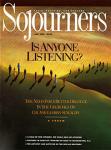In our July 1985 issue, Sojourners published an article on sexual ethics. It contained a short section on homosexuality, which became the overwhelming focus of the response to the piece. The essay's broader discussion on Christian ethics and human sexuality was unfortunately lost in the controversy that followed, and, even more regrettable, a number of our readers felt hurt and angered by what they regarded as a very brief -- and to some insensitive -- treatment of gay and lesbian sexuality. Others liked the article, and we were literally deluged with letters to the editor, many filled with great emotion.
Neither the magazine staff nor Sojourners Community had discussed the topic of homosexuality before that article was run, and its publication generated much discussion, strong feelings, and divided opinions here at home. We said in subsequent issues of Sojourners that we would continue the dialogue among ourselves, while publishing articles that reflected the consensus we did have on issues such as the just and equitable treatment of gay and lesbian people in regard to civil and human rights and the urgency of addressing the AIDS crisis -- a special concern to members of the gay community -- with compassion, sensitivity, and political commitment.
We now find ourselves in a dialogue and debate that has swept up the churches in one of the most painful, anguishing, and perplexing questions the Christian community has encountered in a long time. How should the churches respond to homosexuality and, most important, to gay and lesbian Christians in their midst? Sojourners' own constituency is not of one opinion on this issue. Christians deeply and passionately committed to justice and reconciliation find themselves at different places on the complicated questions raised by gay and lesbian sexuality.
That most churches are dealing with the questions and listening to the people involved is a very good and positive thing. But the dialogue has often been quite impoverished, with too much rhetoric, ideology, fear, and insensitivity replacing honest and sincere wrestling with the hard questions and difficult dilemmas the controversy poses.
In many conservative churches and seminaries, gay and lesbian voices simply cannot be heard, producing a cultural orthodoxy that requires an enforced silence. In more liberal church sectors and seminaries, gay and lesbian sexuality is affirmed and no challenging questions or concerns are tolerated by the prevailing political orthodoxy. Neither climate breeds good, helpful, and ultimately healing dialogue. Neither homophobic fears nor politically correct ideologies will allow the open space needed for real conversation to occur.
WE NEED a better dialogue -- more open, listening, searching, and, most of all, more humble than most of us have been. We offer this forum on the subject of gay and lesbian sexuality and the churches' response as a small contribution toward a better dialogue. Sojourners isn't taking a position in this forum, in part because as a staff we all haven't reached clarity or agreement; but also because we're not sure it would best serve our constituency and the churches at this moment. Some issues are so profoundly pastoral that the first requirement is to make sure that we have listened carefully. Our editorial perspective at this moment is that people on different sides of the question need to do a much better job of talking together.
We asked people to write who have different perspectives and life experiences. We asked only those who, despite their differences, share a common commitment to justice and human rights for all people, regardless of their sexual orientation, and to an inclusive church open to all who know their need for the grace of God. We asked our authors to focus on the theological, biblical, and pastoral issues at stake in the churches' debate, being careful to keep the personal nature of the issues at the center of the conversation -- that we not forget the human beings at the heart of the controversy.
We are aware that the individual opinions expressed here may be difficult for some to read and will probably create strong reactions -- on all sides. But we feel that they are fair in their representation of a spectrum of voices in the debate sweeping the churches. If we are to find any common ground, especially in the churches, we shall have to grant an integrity to the convictions and concerns of others with whom we may not agree. The practice of attacking, caricaturing, and name-calling -- on all sides -- must come to an end.
The discussion of gay and lesbian sexuality raises questions of sexual ethics for heterosexuals as well, which is where this conversation in Sojourners began some time ago. What are the gospel imperatives and Christian characteristics that should shape and guide our sexual relationships? To that subject we must certainly return.
Because of Sojourners' own tradition, our approach to the questions of gay and lesbian sexuality, and sexual ethics more generally, must have biblical and theological integrity, must be pastorally concerned with the people most affected, must make justice a central priority, and must respond especially to those who have suffered and been abused. Our commitment is to seek to be more faithful to those principles in the days ahead.
We offer this issue of Sojourners with prayers for those people and places in the churches now seeking to find their way through the thicket of contention and controversy surrounding any discussion of these matters -- and for all of us who seek the mind and heart of God in relation to our sexuality.
-- The Editors

Got something to say about what you're reading? We value your feedback!
